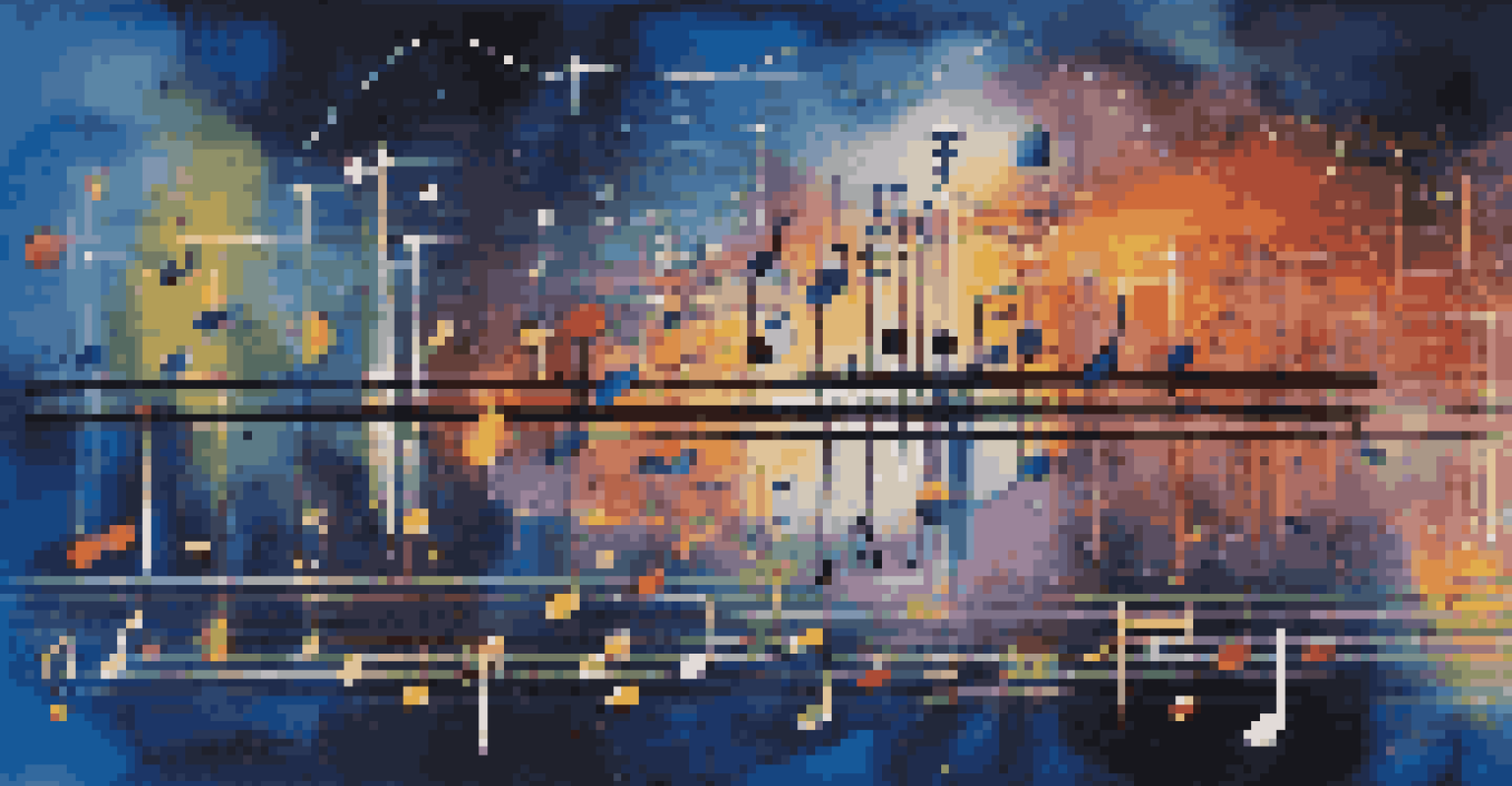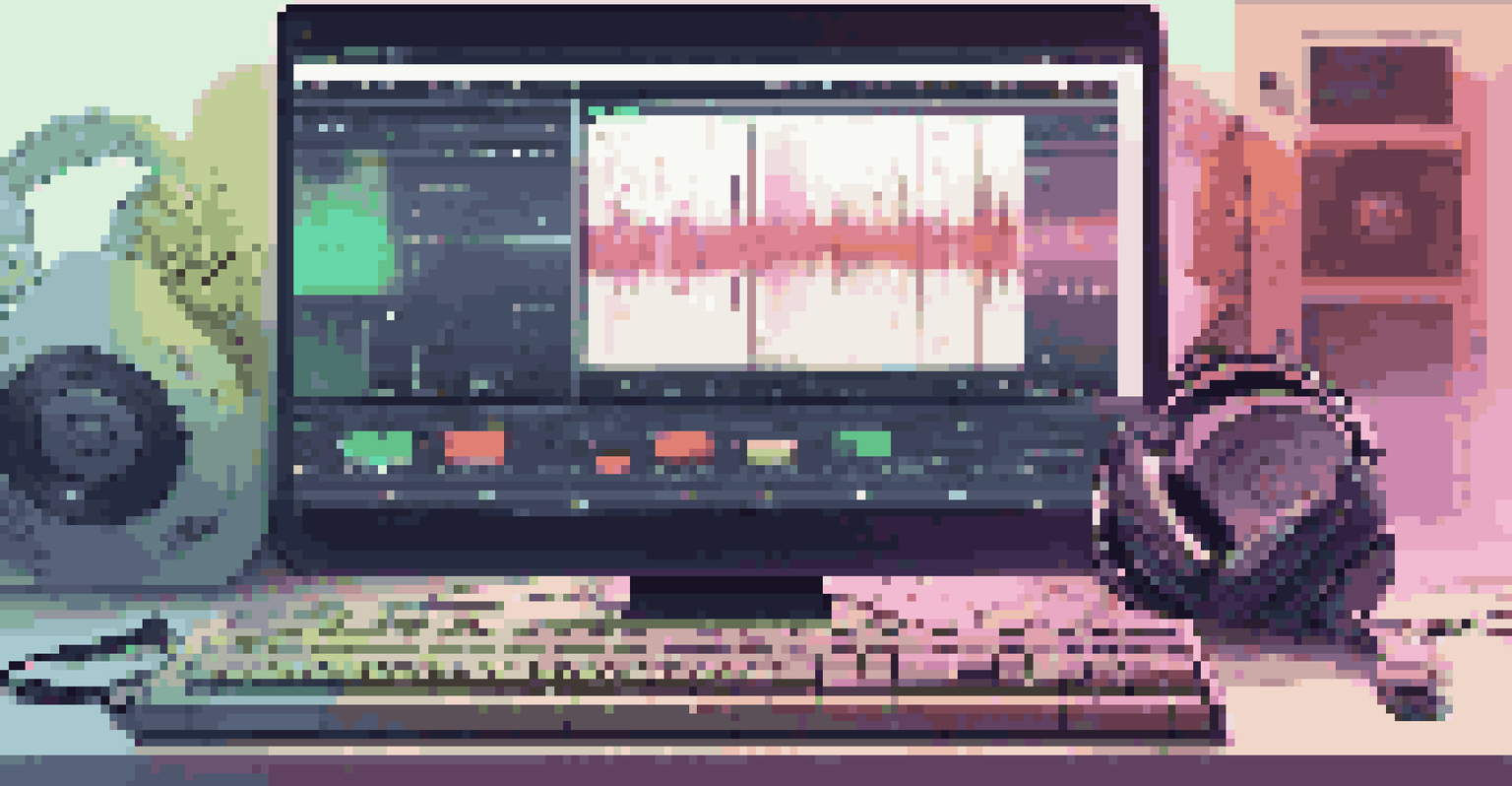The Impact of AI on Music Production: Tools and Techniques

Understanding AI's Role in Modern Music Production
Artificial Intelligence (AI) has become a game-changer in music production, blending technology with creativity. It enables musicians and producers to streamline their workflow and discover new sounds. By analyzing existing music, AI can generate melodies, harmonies, and even lyrics, acting almost like a collaborative partner. This shift is not just about efficiency; it's about expanding the boundaries of what music can be.
Artificial Intelligence is the new electricity.
Imagine having a tool that can predict the mood of a song based on its tempo and key. AI can do just that, analyzing vast datasets to understand musical trends and preferences. This means that producers can tailor their creations to meet audience expectations more effectively. The creative process becomes less about guessing and more about informed decision-making.
As AI continues to evolve, the music industry is seeing an influx of innovative tools that can automate repetitive tasks. From mixing and mastering to sound design, these tools enhance productivity and allow artists to focus on their artistic vision. This fusion of human creativity and AI technology is paving the way for a new era of music production.
AI Tools Revolutionizing Music Production
There are numerous AI tools available today that are transforming how music is produced. For instance, platforms like Amper Music and AIVA allow users to create music by simply inputting desired parameters. These tools take into account various musical elements, generating unique compositions in a matter of minutes. This accessibility democratizes music production, allowing anyone to experiment with creating their own tracks.

Another notable tool is LANDR, which uses AI to provide automated mastering services. Mastering is often a complex and time-consuming process, but LANDR simplifies this by analyzing the track and applying the necessary adjustments to optimize sound quality. This not only saves time but also ensures that even novice producers can achieve professional-sounding results.
AI Enhances Creativity in Music
AI tools offer musicians new ideas and inspiration, fostering collaboration that leads to innovative musical outcomes.
Furthermore, tools like Google’s Magenta project explore the intersection of machine learning and music. By using deep learning algorithms, Magenta can help artists create new sounds and experiment with different musical styles. This kind of innovation is helping musicians break free from traditional constraints and encourages a more adventurous approach to music creation.
Enhancing Creativity with AI in Music
AI can serve as a powerful catalyst for creativity, offering inspiration and new ideas to musicians. By analyzing existing music, AI can suggest chord progressions, melodies, or even lyrics that an artist might not have considered. This collaboration between human and machine can lead to unexpected and exciting musical outcomes, enriching the creative process.
The future of music is in the hands of those who can harness the power of technology and creativity together.
For example, artists can use AI-generated samples or loops as a starting point for their tracks. This can spark new ideas and help break through creative blocks. Instead of starting from scratch, musicians can build upon these AI-generated foundations, combining their unique styles with the fresh sounds provided by technology.
Moreover, AI tools can adapt to an artist's preferences over time, learning from their choices and suggesting more personalized options. This tailored approach not only enhances the creative process but also allows for a deeper exploration of an artist's style, leading to unique and innovative music that resonates with listeners.
The Benefits of AI in Music Collaboration
Collaboration is at the heart of music, and AI is enhancing this aspect in exciting ways. Remote collaboration has become more effortless with AI tools that facilitate real-time editing and feedback. Musicians can work together, regardless of their physical location, using platforms that utilize AI to synchronize their efforts and streamline the creative process.
Additionally, AI can help bridge the gap between different musical genres. For instance, a producer could use AI to blend elements of jazz with electronic music, creating a unique fusion that may not have emerged otherwise. These tools encourage experimentation and help artists to think outside the box, leading to innovative cross-genre collaborations.
AI Tools Transform Music Production
Platforms like Amper Music and LANDR simplify the music creation process, making it accessible for everyone to produce professional-quality tracks.
Furthermore, AI can analyze the contributions of various collaborators and suggest ways to enhance the overall sound. This feature not only improves the end product but also fosters a sense of unity among musicians, as they can see how each contribution fits into the bigger picture. The result is a more cohesive and well-rounded musical experience.
AI and the Evolution of Music Genres
As AI technology advances, we're witnessing shifts in music genres that are influenced by these innovations. Genres like electronic and hip-hop have already embraced AI, leading to the creation of entirely new sub-genres. By utilizing AI tools, artists can experiment with sounds and styles in ways that were previously unimaginable, pushing the boundaries of genre conventions.
For example, AI-generated music has begun to make its way into mainstream pop, with artists incorporating machine-generated elements into their tracks. This not only reflects a changing landscape in music production but also highlights the growing acceptance of AI as a creative partner. Listeners are now exposed to a wider variety of sounds and styles, resulting in an ever-evolving musical experience.
Moreover, as AI continues to influence music production, we can expect to see even more hybrid genres emerge. The ability to blend different musical styles and traditions through AI will likely lead to the creation of unique sounds that resonate with diverse audiences. This evolution is not just a trend; it's a reflection of how technology can shape the future of music.
The Future of AI in Music Production
Looking ahead, the future of AI in music production is full of potential and possibilities. As technology continues to advance, we can expect even more sophisticated AI tools that will enhance creativity and streamline workflows. This evolution will likely lead to more artists embracing AI as an essential part of their creative process, rather than just a tool.
Moreover, the integration of AI in music production may also lead to new business models within the industry. For instance, AI could help identify emerging trends, enabling producers to create music that resonates with audiences before it becomes mainstream. This proactive approach could help artists stay ahead of the curve and achieve greater success in a competitive market.
Ethics of AI in Music Creation
As AI-generated music rises, ethical questions about ownership and authenticity challenge the traditional landscape of music production.
Ultimately, the relationship between AI and music production is likely to deepen, fostering collaborations that blend human intuition with machine learning. As we embrace this new era of creativity, the possibilities are endless, and the music we create will reflect the exciting intersection of technology and artistry.
Ethical Considerations in AI Music Production
While the benefits of AI in music production are clear, there are also important ethical considerations to keep in mind. Questions around copyright and ownership arise when AI generates music. Who owns a song created by an AI tool? These questions are becoming increasingly relevant as AI-generated music gains traction in the industry.
Additionally, there's the concern that relying too heavily on AI could dilute the authenticity of musical expression. Music is often a reflection of human experience, and some worry that AI-generated content may lack the emotional depth that comes from human creativity. Striking a balance between technology and emotional connection is crucial to preserving the essence of music.

As we navigate this evolving landscape, it’s essential for artists, producers, and industry stakeholders to engage in conversations about the ethical implications of AI in music production. By establishing guidelines and best practices, we can ensure that the integration of AI enhances creativity while respecting the artistry that defines music.